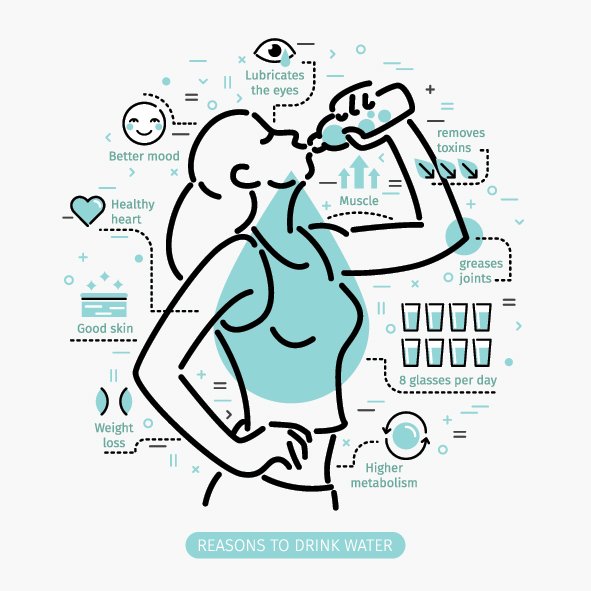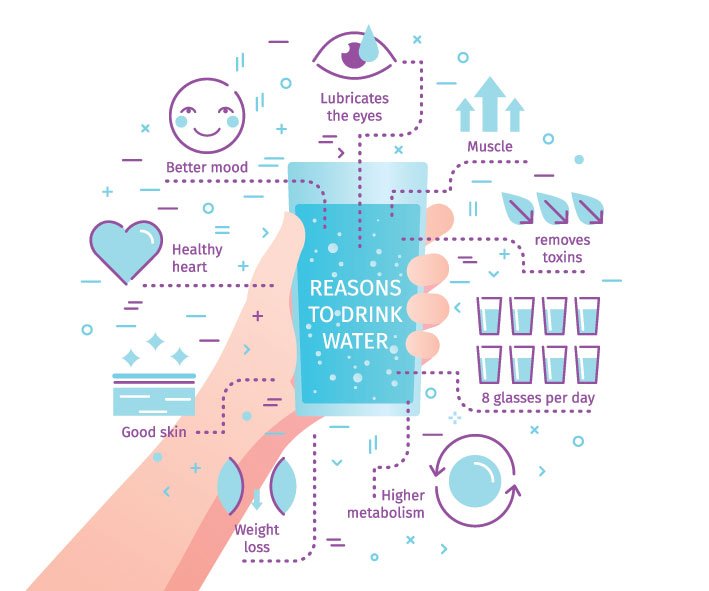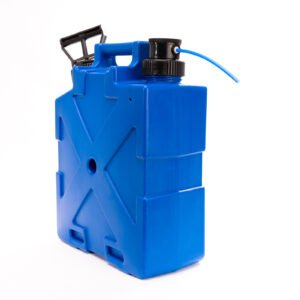Water and Your Diet
Water plays an essential part in your body’s ability to live day by day. It goes hand in hand with your breathing, how much you feed your body, your diet, and how much water you drink.
There are so many good, actually vital reason to drink more water than you think you need on a daily hasis . It is very hard to remember to keep drinking as it is not natural. From first hand experience, don’y avoid as the long term consequences are not worth it.
My tip, if you are at home or office have a jug with your daily intake, if you are outside, have a number of water bottles.
Water is a source of nourishment that continually needs to be replenished.
Before we begin, let’s break down and clarify just how important water is to you:
- 75% of your body is made up of water
- Your blood is roughly 95% water
- Your brain is roughly 75% water, and
- your skin is roughly 80% water

Did you know that water specifically does not reduce weight loss though in stops you drinking high calorie drinks.

As you can see, making sure you’re hydrated and that you’re drinking enough water is vital. Your body will reach dehydration after losing 2% of your body’s water mass. If you are dehydrated, you will most likely have a headache, you may feel dizzy, and you will suffer from decreased blood pressure.
Most people suffer from mild dehydration due to a lack of awareness of the importance of water in your diet. An easy way to check if you suffer from dehydration is to ask yourself the following questions:
- Are you thirsty?
- Do you urinate less than you’d typically need to?
- Is your urine abnormally dark?
- Are you tired, and you’re not sure why?
- Are you moody?
- Do you get dizzy when you stand up?
- Do you have a dry mouth?
If you answered yes to one or more of these questions, then you are more than likely dehydrated.
Fortunately, the cure is simple, drink more water! If you still don’t feel well after a few glasses, we recommend you get in touch with your doctor and seek professional advice.
Importance of Water in Your Diet
Water is the second most essential need for your survival after oxygen. The multiple functions of water in your body starts in your bloodstream. Water helps maintain healthy body temperature and regulate your blood circulation, keeping your heart pumping.
Water plays a vital role in your digestive system and the absorption of food. It is responsible for carrying vital nutrients and oxygen to cells through your bloodstream.
Water and weight loss
Do eight glasses of water a day really keep the fat away? While eight glasses are said to be the standard amount of water your body requires each day, these eight glasses do much more than just keep you hydrated. Whether drinking water helps lose weight is up for debate, but it certainly helps avoid it.
Water not only suppresses hunger urges, but it is also crucial in sustaining a healthy metabolism. One thing that is important to understand is that your kidneys need water to get rid of waste and toxins in your body. When your kidneys can’t cope, your liver assists them in with waste excretion. This is a problem because one of your liver’s primary functions is to assist in managing metabolizing body fat. If your liver can’t focus on this primary function, then fat remains stored in your body, and weight loss stops.
The fact is that not drinking enough makes you gain weight. When you don’t give your body enough water, it takes this as a threat to your survival and begins to conserve water. This improper fluid balance will create an excess of sodium, which can contribute to fluid retention. This will cause your feet and hands to swell as your body holds on to water.
When is too much water too much?
The amount of water that is healthy for each person to drink in a single day depends entirely on the individual. Some studies show that the body can never have too much water. The body will simply get rid of the water that is not needed.
However, too much water is said to be taxing on your kidneys and could potentially cause water intoxication, otherwise known as water poisoning.
This occurs when the body is over-hydrated, which can be just as bad as not drinking enough water.
Water intoxication is caused by the dilution of sodium in the body, which leads to the swelling of the brain.
This is a common occurrence in athletes who sweat heavily, losing electrolytes. Drinking large amounts of water does not replenish these electrolytes and eventually leads to water poisoning.
When exercising, be sure to replace lost electrolytes by drinking sports drinks recommended by your gym or doctor.




